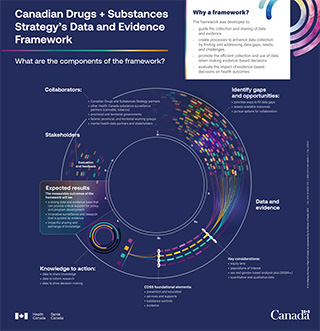Canadian Drugs and Substances Strategy’s data and evidence framework

Download the alternative format
(PDF format, 384 KB, 1 page)
Organization: Health Canada
Why a framework?
The framework was developed to:
- guide the collection and sharing of data and evidence
- create processes to enhance data collection by finding and addressing data gaps, needs, and challenges
- promote the efficient collection and use of data when making evidence-based decisions
- evaluate the impact of evidence-based decisions on health outcomes
What are the components of the framework?
- Collaborators:
- Canadian Drugs and Substances Strategy partners
- other Health Canada substance surveillance partners (cannabis, tobacco)
- provincial and territorial governments
- federal, provincial, and territorial working groups
- mental health data partners and stakeholders
- Identify gaps and opportunities:
- prioritize ways to fill data gaps
- assess available resources
- pursue options for collaboration
- Data and evidence
- Key considerations:
- equity lens
- populations of interest
- sex and gender-based analysis plus (SGBA+)
- quantitative and qualitative data
- CDSS foundational elements:
- prevention and education
- services and supports
- substance controls
- evidence
- Knowledge to action:
- data to share knowledge
- data to inform research
- data to drive decision-making
- Expected results
The measurable outcomes of the framework will be:- a strong data and evidence base that can provide critical support for policy and program development
- innovative surveillance and research that is guided by evidence
- impactful sharing and exchange of knowledge
- Stakeholders
- Evaluation and feedback